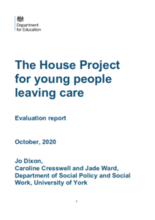Introduction
This report presents findings from an evaluation of the House Project (HP). The HP (an expansion of the Stoke-on-Trent HP pilot) was funded via Round 2 of the U.K. Department for Education’s (DfE) Children’s Social Care Innovation Programme from April 2017 to March 2020. It aimed to implement the HP framework for young people leaving care in 5 local authorities (LAs) and create a central hub, the National House Project (NHP), to coordinate local house projects (LHPs) and further develop and expand the approach.
The project
The HP aims to improve outcomes for young people (in accommodation, education, employment and training (EET), wellbeing, autonomy and integration) and service level outcomes (including sustainability and scale-up of the HP, standardising HP processes to improve implementation and delivery, recruiting further LAs and achieving cost savings). The HP supports young people leaving care aged 16 and over to have greater control of their transitions to independent living. The main components include help to move to their own tenancies with intensive, individualised pre and post-move support. This includes provision of a 6 to 9 month accredited modular skills development HP programme (HPP), underpinned by ORCHIDS (the HP’s own framework comprising key areas for working with young people, based on the theory of self-determination) and psychologically informed practice, to improve young people’s independent living skills and their tenancy and EET readiness. The NHP took over operational management from the Round 2 lead LA (Warwickshire) in 2018. It supported the initial set-up and early operation of each LHP to enable them to deliver their own projects. Each LHP has a project manager and 2 support workers (facilitators) to work with a cohort of around 10 young people. There is a strong focus on groupwork, peer support and relationships. For example, the HP works with young people to form a community of support via weekly group meetings and the Care Leavers National Movement (CLNM). For LHP staff, the monthly community of practice workshops enable peer support via knowledge sharing, training and access to the expertise of the NHP team and psychology, participation and education consultants.

